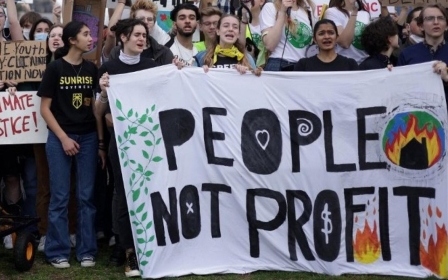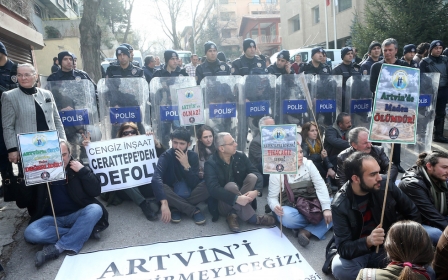Turkey: Villagers in 'climate justice struggle' as they battle to save woodland

A two-year-long campaign by local activists to save Akbelen forest, in the Mugla region in southwest Turkey, has been brought to a head as Turkish security forces led a violent crackdown on protesters observing a vigil over the woodland.
Residents of the nearby town, Ikizkoy, and environmental activists clung to trees as they endured an onslaught of tear gas and water cannons. At least 14 activists have reportedly been detained, and others hospitalised.
Over the past two years, the 780 acres of woodland has been the site of a battle by the villagers to stop energy giant YK Energy from razing the forest in order to extract lignite (brown coal) from its soil to fuel three neighbouring power plants.
In 2020, the forestry ministry granted the company permission to clear the forest.
The villagers successfully halted logging in July 2021, and have since then held a constant vigil over the forest.
New MEE newsletter: Jerusalem Dispatch
Sign up to get the latest insights and analysis on Israel-Palestine, alongside Turkey Unpacked and other MEE newsletters
But despite an ongoing lawsuit, the authorities lifted the temporary ban and, on 24 July, loggers arrived at the site, flanked by the gendarmerie and armoured trucks.
The peaceful vigil erupted into violent skirmishes between the gendarmerie, armed with water cannons and tear gas, and local activists.
“It was like warfare,” Climate Justice Coalition coordinator, Cigdem Ozbas told Middle East Eye. “Even MPs were being attacked.”
In a press release on 30 July, the forestry ministry announced a halt to the felling, stating that 130,000 saplings would be planted in the area.
However, on Tuesday morning, protesters reported being “besieged” by gendarmerie forces in a dawn raid on the camp.
Activists have also reported the use of “signal jammers” to block social media access.
“There was a barricade, they didn’t let people off the site until 1pm,” environmental engineer Deniz Gumusel told MEE via a WhatsApp call from the camp. “[It was like] they were being held in custody.”
Gumusel, who has been present at the vigil throughout the week of protests, estimates that roughly three quarters of the forest has already been cleared.
She said the loggers continue to clear the area, and have now begun removing the topsoil, which could prevent the trees being replanted.
Disappearing villages
For the residents of Ikizkoy, this is nothing new.
Over the past 40 years, the construction of three power plants in Mugla - Yatagan, Kemerkoy, Yenikoy - has seen 12 villages disappear to make way for the lignite mines to fuel them.
According to a 2022 report by the Health and Environment Alliance, the air pollution produced by the plants has caused over 68,324 premature deaths, 43,725 cases of premature births and 455,738 cases of bronchitis in children from 1982 to 2020.
Despite a court order to close down the plants in 1997, they have continued to operate.
In 2014, the plants were bought by Limak Holding and IC Ictas Holding. They were allocated 21,000 hectares of land in Yatagan and 23,000 hectares in Milas for lignite mining to power the plants.
Forty-seven percent of this land was forest and was also home to 60 villages. Only 37 of them are left.
“There are big holes now instead of the villages,” Suheyla Dogan, chairperson of the Mount Ida Natural and Cultural Assets Association, told MEE.
Global struggle
For Ozbas, the level of resistance from local villagers has been unprecedented.
“This is the first time we have (seen) a very consistent struggle, led by the local people,” Ozbas said.
Some of the residents of Ikizkoy had already been moved from now defunct villages to make way for mines.
“This time, they don't want to let go of their homes and livelihoods,” she said.
The Akbelen forest is a vital source of water for surrounding villagers who rely on it to sustain their farmlands. Its destruction, according to Gumusel, could leave 500,000 people without water.
'In every province of Turkey, I can say that there is a local resistance against ecological destruction'
- Deniz Gumusel, environmental engineer
Gumusel said the air pollution from an open mine could impact yields for local farmers, while the dust emitted could also choke olive groves, preventing them from producing fruit.
The resulting depletion of yields could in turn force the villagers to relocate to cities. “This has happened before," she said. “It's enforced displacement."
For Gumusel, who has worked on similar campaigns for the last decade, the plight of Akbelen is a familiar story.
“In every province of Turkey, I can say that there is a local resistance against ecological destruction. Not just coal mines, but metals like gold and copper,” she said.
In 2020, thousands protested the construction of a gold mine by the Canadian company Alamos Gold in the Ida mountains. And in 2017, 20,000 people demonstrated across Turkey to oppose copper mining in Cerateppe, in the northeast of Turkey.
The villagers are not just defending their livelihoods and homes, however.
Soil depletion, floods and the devastating wildfires in 2021, which destroyed 16,000 hectares of land, mean they know their fight is a global one.
“This is a climate justice struggle,” Gumusel said. “Of course they want to save their land… but also, they know that if this is not stopped, there will be more ecological destruction to come.”
Middle East Eye delivers independent and unrivalled coverage and analysis of the Middle East, North Africa and beyond. To learn more about republishing this content and the associated fees, please fill out this form. More about MEE can be found here.





